   |
|||||||||||||||
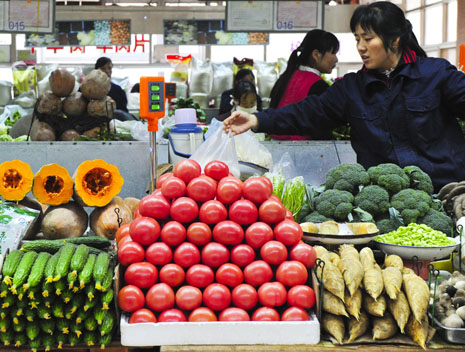 |
Major Macro Economic Statistics
|
||||||||||||||
| Growth indexes | Price indexes | ||||||||||||||
| Industrial output: +13.1% | CPI: +4.4% | ||||||||||||||
| Retail sales: +18.6% | PPI: +5% | ||||||||||||||
| Fixed-asset investment in Jan-Oct: +24.4% | PMI: 54.7% | ||||||||||||||
| FDI: +7.86% | Housing prices: +8.6% | ||||||||||||||
| Financial indexes | Foreign trade indexes | ||||||||||||||
| New loans: 587.7b yuan | Import: +25.3% | ||||||||||||||
| M2: +19.3% | Export: +22.9% | ||||||||||||||
| Fiscal revenue: +14.8% | Trade balance: $27.1b | ||||||||||||||
|
CHINA ECONOMY BY NUMBERS (Monthly Issue)
|
|||||||||||||||
| January | February | March | |||||||||||||
| April | May | June | |||||||||||||
| July | August | September | |||||||||||||
| October | November | December | |||||||||||||
| Data and Graphic | |||||||||||||||
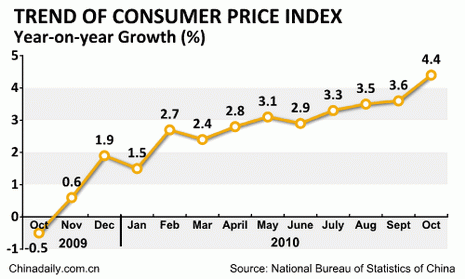 |
China's Oct CPI rises 4.4% Surging food prices pushed up China's consumer price index (CPI), a major gauge of inflation, to a 25-month high of 4.4 percent in October, the National Bureau of Statistics (NBS) said on Nov 11. The figure topped the market forecast of around 4 percent and was sharply up on September's 3.6-percent growth. [Full story] |
||||||||||||||
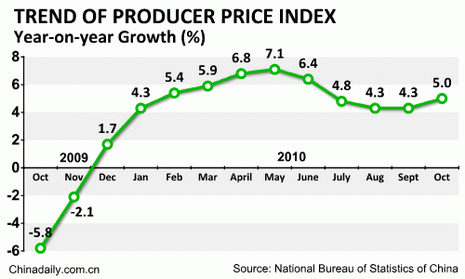 |
China's Oct PPI up 5% China's producer price index (PPI), a major measure of inflation at the wholesale level, rose by 5 percent in October from one year earlier, the National Bureau of Statistics (NBS) said on Nov 11. The growth rate was 0.7 percentage point higher compared with that in August. [Full story] |
||||||||||||||
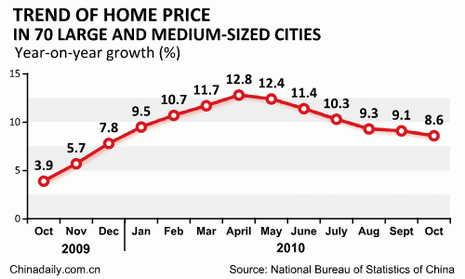 |
China's property price growth slows to 8.6% Property prices in 70 major Chinese cities rose 8.6 percent year-on-year in October, the lowest year-on-year increase this year, the National Bureau of Statistics (NBS) said on Nov 10. The growth rate has eased for six consecutive months from the peak in April at 12.8 percent after the government stepped up controls to curb price surges since April. [Full story] |
||||||||||||||
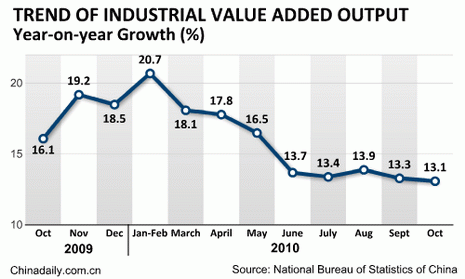 |
China's industrial output up 13.1% China's industrial value-added output increased by 13.1 percent year-on-year in October, the National Bureau of Statistics (NBS) announced on Nov 11. The growth rate for the first 10 months was 16.1 percent year-on-year, down 0.2 percentage points from the January-September period, said NBS spokesman Sheng Laiyun. [Full story] |
||||||||||||||
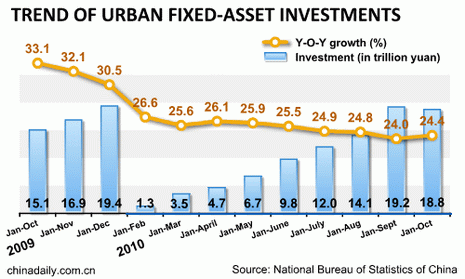 |
Urban fixed-asset investment up 24.4% in Jan-Oct China's urban fixed-asset investment in the first ten months of this year rose 24.4 percent year-on-year to 18.76 trillion yuan ($2.83 trillion), according to data released by the National Bureau of Statistics on Nov 11. The growth rate was 0.1 percentage point lower from that for the first nine months. [Full story]
|
||||||||||||||
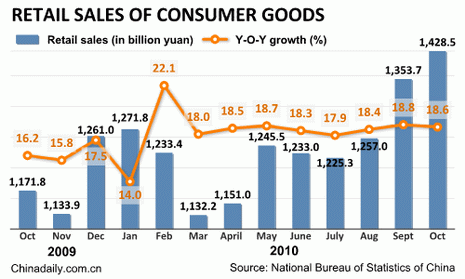 |
China's retail sales of consumer goods up 18.6% China's retail sales of consumer goods hit 1.43 trillion yuan in October, up 18.6 percent year-on-year, the National Bureau of Statistics (NBS) said on Nov 11. Retail sales of consumer goods stood at 1.43 trillion yuan ($215.79 billion) in October and the growth rate was 0.2 percentage points lower than that in September, the NBS spokesman Sheng Laiyun said at a news conference. [Full story] |
||||||||||||||
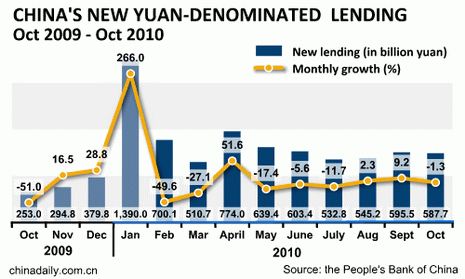 |
China's October new loans fall to 587.7b yuan China's new yuan-denominated lending in October dropped to 587.7 billion yuan ($88.5 billion) from 595.5 billion yuan in September, the People's Bank of China (PBOC), the central bank, said on Nov 11. The figure was higher than market estimations of less than 500 billion yuan after the central bank lifted the required reserve ratio for six banks and surprisingly raised benchmark interest rates in October. [Full story] |
||||||||||||||
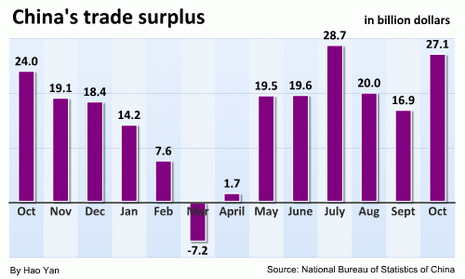 |
Import growth outpaces China's exports China's exports rose 22.9 percent in October from a year earlier, while imports increased 25.3 percent, the General Administration of Customs said Wednesday. China's trade surplus expanded to $27.1 billion last month, compared with $16.88 billion in September, making the October figures the second highest this year after July's $28.73 billion. [Full story] |
||||||||||||||
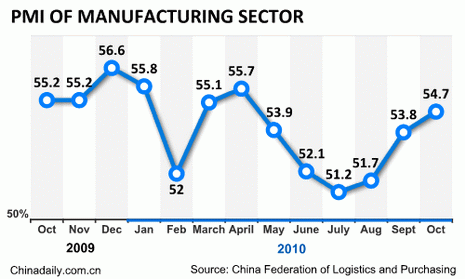 |
PMI hits 54.7% amid inflation concerns The Purchasing Managers Index (PMI) of China's manufacturing sector rose to 54.7 percent in October, suggesting increased inflationary pressures in the near term, the China Federation of Logistics and Purchasing (CFLP) said on Nov 1. The figure, 0.9 percentage points higher than September, was the index's third consecutive monthly increase and 20th straight month above 50 percent, the CFLP said in a statement on its website. [Full story] |
||||||||||||||
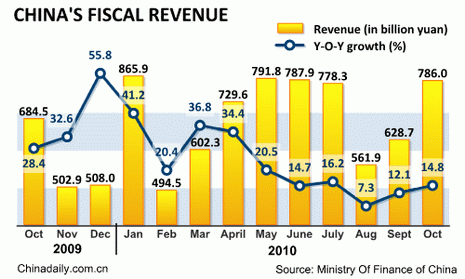 |
Oct fiscal revenue rises 14.8% Y-O-Y China's fiscal revenue intake in October rose 14.8 percent year-on-year to 786.03 billion yuan ($118.66 billion) though the growth rate is likely to slow over the rest of the year, the Ministry of Finance (MOF) said on Nov 11. The October figure took China's fiscal revenue in the first ten months to 7.0899 trillion yuan ($1.07 trillion), up 21.5 percent year-on-year, the MOF said in a statement on its website. [Full story] |
||||||||||||||
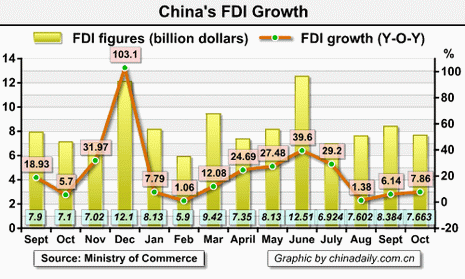 |
China's FDI up 7.86% in October Foreign direct investment (FDI) into China rose for the 15th consecutive month in October, evidence that China remains a favored investment destination for foreign businesses. [Full story] |
||||||||||||||
| Round Table | |||||||||||||||
|
The establishment of a sound income-redistribution system through taxation is essential to maintain economic growth and ensure social harmony. A lack of suitable consumption channels will prompt high-income groups to reserve their wealth instead of spending. [Full Story] |
China has the opportunity to implement a set of policies that can make working in rural areas financially attractive for the younger generations and guarantee adequate food supply to the growing and more demanding population. If necessary, the government should pay direct subsidy, even if it has to be through monthly checks, to farmers. [Full Story] |
||||||||||||||
|
The swiftly widening income gap has time and again sounded alarm. The top 1 percent of Chinese families now own 41.4 percent of the wealth. The blame is placed on the decades-long rural and urban divide. Rural Chinese are left far behind in sharing the economic boom. [Full Story] |
Circumstances at home and abroad mean that China still faces some huge difficulties in its bid to cultivate much-needed domestic demand.
|
Liu Junsheng, a research scholar with the Labor Wage Research Institute, affiliated to the Ministry of Human Resources and Social Security. To begin with, raising the proportion of salary in GDP will meet people's demand and help build a harmonious society. To raise the share of workers' income in GDP, the government should upgrade its industrial structure on a priority basis, because it is one of the main causes of the low proportion of workers' income. [Full Story] |
|||||||||||||
|
Hua Sheng, a professor of economics at Beijing Normal University. The ratio of workers' income in GDP depends more on the stage of a country's economic development. In the same vein, there is no need to narrow the gap between the rich and poor, if it has to be done artificially. If indeed the Chinese government decides to narrow the wealth gap, the measures it will have to take will be a lot more painful than any of the actions people have suggested. [Full story] |
William Daniel Garst, an American corporate trainer in China. The Chinese government must play its part, too, to help the less affluent achieve upward mobility. Although a good start has been made in easing healthcare burdens on less affluent families, especially in rural areas, this safety net is still inadequate. Tax policies, particularly estate taxes, need to be devised to stimulate charitable activity among China's super-rich. [Full story] |
||||||||||||||



